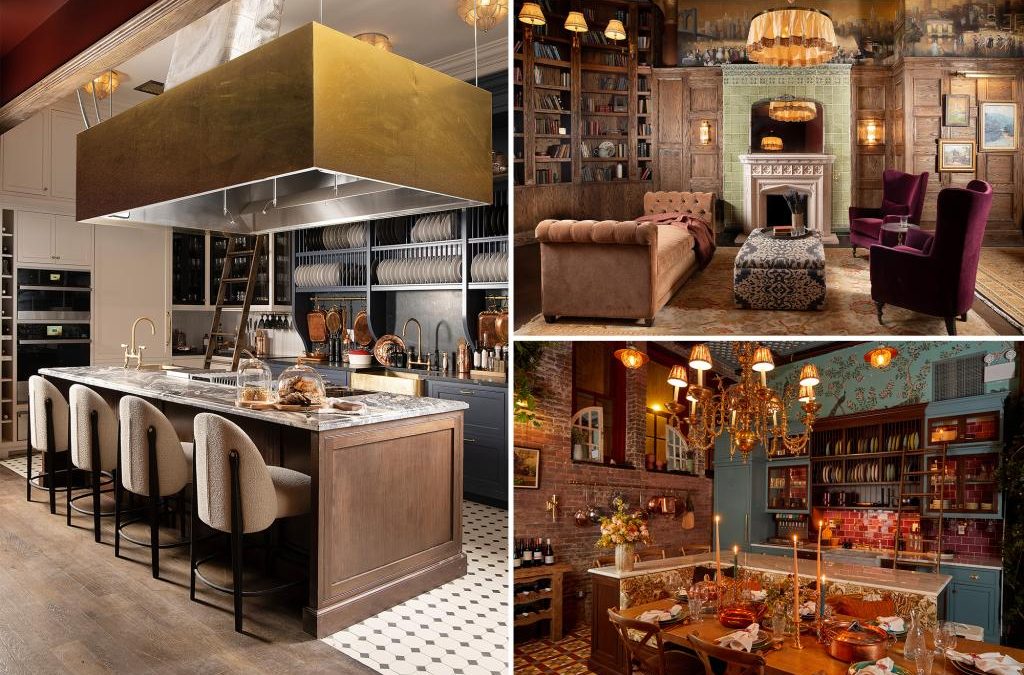Maxwell Social is a new members-only club in Tribeca that costs as much as $12,000 to join – but instead of white-glove service, members can expect to cook their own dinner, pour their own drinks and entertain each other.
While posh rivals such as Soho House or Zero Bond offer luxe spas, bars and restaurants with doting staffers, Maxwell members will bring their own groceries to cook at a decked-out “grand kitchen” full of copper pots and pans, or mix their own gin and tonics.
“There’s a beautiful thing when someone walks in and says ‘how can I help?’ and starts cutting zucchini,” David Litwak, a 35-year-old tech entrepreneur and co-founder of Maxwell Social, told The Post. “It breaks down all barriers between the higher-status people and the lower-status people.”
Set to formally open on Thursday at 135 Watts St., Maxwell Social bills itself as a “basement man cave/she shack.” Staffing will be minimal, according to Litwak, with just five employees handling basic tasks such as club entry and security, bottle restocking, upkeep and help with bartending, if needed.
The club is betting that its blank-canvas approach will lure applicants weary of the sterile experience at other private clubs – though the cost of entry may cause some sticker shock.
Members pay $7,000 for access to a private four-bottle liquor locker or $12,000 for a larger eight-bottle locker that serves as the standard price of admission. Candidates also can opt for a $2,500 “scholarship tier” membership – the minimum offered by Maxwell – that provides entry to a communal storage area.
Members also pay $250 in monthly dues and receive a certain number of guest passes, depending on their plan.
The stiff prices come despite a lack of amenities found at rivals that are better-known — and lower-priced. The original Soho House New York in the Meatpacking District offers a rooftop pool and terrace, a spa, an onsite bar and restaurant with waitstaff and a screening room.

Yearly Soho House memberships start at $2,667, plus a one-time introduction fee of $1,088.75 and the cost of food, drinks and other add-ons.
“No one thinks you’re slumming it in an Airbnb if it’s a French chateau Airbnb that you happen to be cooking your eggs in,” Litwak argues. “People understand this is a different type of luxury.”
Litwak adds that he is “not particularly concerned” that Maxwell Social’s steep prices and lack of amenities will turn off prospective members, pointing out that Maxwell is located “in the most expensive zip code in New York City.”
“Once people understand what we’re building, I think people understand that it’s priceless,” he added.
Meanwhile, Maxwell’s leadership team is convinced their concept is a cinch for investors. Initial backers include Victoria’s Secret CEO Martin Waters, former Peloton instructor Chase Tucker and prominent tech-focused investors Josh Koppelman, Gil Penchina and Balaji Srinivasan, according to Litwak.
Litwak said the business will be “50% more efficient per square foot,” because it opted to build out the club in a landmarked, side-street property formerly occupied by the now-shuttered restaurant China Blue. Maxwell repurposed a basement that was previously “being used for dumpling storage,” he said.
“You can’t run a community space efficiently and treat it like a campus where people can do what they want if you have massive fixed costs,” he said. “When you lower your fixed costs, you can be wildly profitable at a much lower tier and you can be much more accessible to a much wider community.”

Litwak compared the plan to that of the now-shuttered Norwood Club, which had a similar planned membership base but a bigger real-estate footprint and a much larger workforce of 45 full-time staffers.
To date, the club has admitted just 75 paying members – though the co-founders plan to accept a total of 700 in the months ahead. Peter Niehaus, a Maxwell Social member and investor, admitted that he thought Litwak’s plan to rapidly gain 700 members was “ludicrous” given the strict vetting process.
Prospective candidates are interviewed twice and required to attend at least one event to ensure they “really vibe with the community” before being granted access, according to Litwak.

“We want to make sure it doesn’t end up being a bunch of tech and finance guys,” Litwak said. “We’re not against tech and finance guys, to be clear, but we want to make sure it has a fair amount of artists and academia and politics and more on there.”
Niehaus added he was confident the club’s event rental business will be “really profitable” while memberships ramp up.
The club hosted a political fundraising event for Sen. Chris Murphy (D-Conn.) on June 5 and a star-studded party for Creative Artists Agency on June 10 that featured appearances by Oscar-winning actor Brendan Fraser and Bravo kingpin Andy Cohen.
Still, Niehaus said the team’s focus on community over flashy extras was what attracted him to the idea.

“There are a lot of social clubs out there where the members don’t actually know each other,” Niehaus told The Post.
To fund Maxwell’s operations and planned expansion, the co-founders are pitching applicants on the concept of membership as a long-term investment.
The plan is to offer proofs of membership as digital “equity bonds” – which will ostensibly accrue value as demand for membership slots grows – and be tradable on the blockchain. In essence, members will be able to “redeem” their initial entry fee at a later date, so long as someone is willing to buy it.
Litwak said his team viewed a “communal funding mechanism,” traditionally employed at country clubs and similar local gathering spots, as “the OG NFT, measuring access to a community.”
Source




